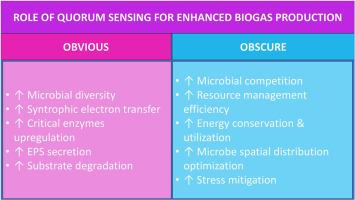Obscure quorum sensing-mediated modulations facilitating enhanced biogas production
IF 16.3
1区 工程技术
Q1 ENERGY & FUELS
引用次数: 0
Abstract
A stable functioning of microbial metabolism is critical for AD; however, due to the physiological limitations of the microbes involved, it encounters frequent system failures. Strengthening of the elaborate nexus between fermentative bacteria and methanogenic archaea is pivotal for AD. This will enable robust interspecies exchange and communication involving quorum sensing (QS) in syntrophic interactions, enhancing viability of the microbes. Over the years, several QS-mediated regulations of AD for enhanced methanogenesis have been apparent, such as, improvement in microbial community structure and substrate degradation, increased secretion of EPS, etc. However, there are some atypical, obscure QS influences that need attention. For example, increased microbial competition, secretion of public goods for optimal resource partitioning and conservation of energy, modulation of downstream signal transduction, and alleviation of various kinds of stresses. In this vein, we review the less-known QS modulations of AD and methanogenesis comprehensively. It is evident that tweaking the molecular mechanisms and signaling pathways, and underexplored themes such as role of secondary messengers, management of oxidative stress, and optimization of endogenous stimulation versus exogenous addition would aid optimal regulation of QS in AD via a robust microbial community structure, ensuring consistent biogas production with high methane content. A critical assessment on current challenges and future research directives suggests the need for determining the QS molecules functional in methanogens, role of inter-domain communication, activation of genetic circuits, etc., via gene knockout studies and heterologous expression combined with metabolomics in realizing the full potential of QS in AD for enhanced biogas production.

模糊的群体感应介导的调节促进了沼气的产生
稳定的微生物代谢功能对AD至关重要;然而,由于所涉及的微生物的生理限制,它经常遇到系统故障。加强发酵细菌和产甲烷古菌之间的复杂联系是AD的关键。这将使强大的物种间交流和沟通包括群体感应(QS)在共生相互作用中,提高微生物的生存能力。多年来,qs介导的AD对甲烷生成的调节作用已经很明显,如微生物群落结构和底物降解的改善,EPS分泌的增加等。然而,有一些非典型的、模糊的QS影响需要注意。例如,微生物竞争的增加,公共产品的分泌以实现最佳资源分配和能量保存,下游信号转导的调节,以及各种压力的缓解。在这方面,我们全面回顾了不太为人所知的QS对AD和甲烷生成的调节。很明显,调整分子机制和信号通路,以及未被充分探索的主题,如次级信使的作用、氧化应激的管理、内源刺激与外源添加的优化,将有助于通过强大的微生物群落结构优化AD中的QS,确保高甲烷含量的稳定沼气产量。对当前挑战和未来研究方向的关键评估表明,需要通过基因敲除研究和异源表达结合代谢组学来确定QS分子在产甲烷菌中的功能、结构域间通信的作用、遗传回路的激活等,以充分发挥QS在AD中提高沼气产量的潜力。
本文章由计算机程序翻译,如有差异,请以英文原文为准。
求助全文
约1分钟内获得全文
求助全文
来源期刊

Renewable and Sustainable Energy Reviews
工程技术-能源与燃料
CiteScore
31.20
自引率
5.70%
发文量
1055
审稿时长
62 days
期刊介绍:
The mission of Renewable and Sustainable Energy Reviews is to disseminate the most compelling and pertinent critical insights in renewable and sustainable energy, fostering collaboration among the research community, private sector, and policy and decision makers. The journal aims to exchange challenges, solutions, innovative concepts, and technologies, contributing to sustainable development, the transition to a low-carbon future, and the attainment of emissions targets outlined by the United Nations Framework Convention on Climate Change.
Renewable and Sustainable Energy Reviews publishes a diverse range of content, including review papers, original research, case studies, and analyses of new technologies, all featuring a substantial review component such as critique, comparison, or analysis. Introducing a distinctive paper type, Expert Insights, the journal presents commissioned mini-reviews authored by field leaders, addressing topics of significant interest. Case studies undergo consideration only if they showcase the work's applicability to other regions or contribute valuable insights to the broader field of renewable and sustainable energy. Notably, a bibliographic or literature review lacking critical analysis is deemed unsuitable for publication.
 求助内容:
求助内容: 应助结果提醒方式:
应助结果提醒方式:


